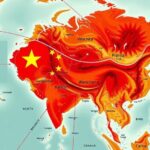Dalai Lama Criticizes China’s Lack of Political Will in “Voice for the Voiceless”
In “Voice for the Voiceless,” the Dalai Lama criticizes China for lacking the political will to resolve Tibet’s status, despite previous dialogues. He expresses disappointment over missed opportunities for negotiation and reiterates his advocacy for the Middle Way Approach to maintain Tibetan identity. The Dalai Lama warns of potential blame directed at Chinese leadership if no resolution occurs during his lifetime.
In his recent book, “Voice for the Voiceless,” the 14th Dalai Lama expresses his deep concern regarding the lack of political commitment from China to resolve the Tibetan issue. Released earlier this month, the book highlights that despite two dialogues held between 1979-1989 and 2002-2010, the Chinese government did not progress beyond the five points initially proposed by Hu Yaobang, relating specifically to the Dalai Lama’s status.
The Dalai Lama critiques the Chinese leadership for lacking the necessary political will and courage to address the Tibet situation effectively. He articulates his disappointment that Beijing missed opportunities for a mutually beneficial resolution. He notes, “Although there might have been, at one point, a genuine wish and desire to resolve the issue of Tibet through negotiation, there was neither the courage nor the necessary political will to do so on the part of Chinese leadership.”
The last interaction between Chinese officials and Dalai Lama’s representatives occurred in January 2010, with no subsequent discussions held. In the book, he reiterates his consistent position on resolving the Tibet issue, advocating for the Middle Way Approach, which seeks to provide a framework allowing Tibetans to maintain their distinct cultural identity while coexisting with China.
The Dalai Lama reflects on his moral authority in encouraging the Tibetan people to pursue a pragmatic solution, lamenting that Beijing has not recognized these efforts. He warns that if a resolution remains elusive during his lifetime, the Tibetan people will hold the Chinese leadership accountable for failing to reach a settlement. Additionally, he anticipates that many Chinese citizens, especially Buddhists, will also regret the government’s inability to address this enduring issue.
Having fled to India in 1959 following an unsuccessful uprising against Communist rule in Tibet, the Dalai Lama has lived in exile in Dharamshala, Himachal Pradesh, nurturing the Tibetan cause for decades.
The Dalai Lama’s “Voice for the Voiceless” underscores his ongoing frustration with China’s lack of political will to resolve the Tibetan issue. He emphasizes his commitment to a pragmatic solution through the Middle Way Approach, while critiquing Beijing’s missed opportunities for dialogue. The Dalai Lama expresses concern about the future, highlighting the potential consequences for both Tibetan and Chinese communities as they navigate the unresolved conflict.
Original Source: www.hindustantimes.com








Post Comment